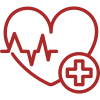JOIN OUR HEALTHY HEART MEMBERSHIP HERE: https://healthyheartnetwork.com/page/starter
Welcome to Doctor Warrick's Podcast Channel.
Warrick is a practicing cardiologist and author with a passion for improving care by helping patients understand their heart health through education. Warrick believes educated patients get the best health care. Discover and understand the latest approaches and technology in heart care and how this might apply to you or someone you love.
Hi, my name's Doctor Warrick bishop and I'd like to welcome you to my consulting room. Today I'd like to cover a few cardiovascular risk facts that you may find interesting. Fact #1 is related to alcohol. Everyone's ears prick up when you mention alcohol and cardiovascular risk. Well the question is, does abstinence improve your risk of avoiding a heart attack? Well let's cross our fingers and go to the literature. It turns out that abstinence doesn't protect you from coronary artery disease risk and it turns out in fact that maybe one or two standard drinks a day may well be protective. Isn't that great news?
So there's certainly no suggestion that drinking to excess is beneficial as it can raise blood pressure. It can damage the heart. And of course have multiple other organ damages and effects. But, 1-2 alcoholic drinks on a regular basis does help. That probably helps relax you, it may help with a little bit of blood pressure lowering and it may raise HDL cholesterol which could all be of benefit. There may also be that walking to the local bottle shop to pick up your alcohol is part of that positive effect, but that remains to be tested.
Cardiovascular risk fact #2: Does Vitamin E reduce your blood pressure or your cardiovascular risk. Lots of people take Vitamin E hoping that's going to provide some positive benefit to their health. Well it turns out that when you look at the studies where Vitamin E has been included, it's not a comprehensively clear-cut indicator that it does provide benefit. So, probably at this stage, the general consensus will be would be it's not beneficial in the big scheme of things.
Cardiovascular risk fact #3: Should everyone be taking aspirin? Should people over 40 be taking aspirin? And should people with cardiovascular risk over the next 10 years of greater than 7 percent be taking aspirin?The answer to this is probably no. The current guidelines would suggest that people between 50 and 59 are probably the group that should be considering taking aspirin, that they only do that if their 10-year risk of a cardiovascular event is 10 percent or greater. So matching up risk and benefit. They would take it if they don't have an indication for bleeding or something that could lead to bleeding.
It turns out that aspirin, at least in the trials that we've done, really only shows benefit after a number of years of taking it. So we would recommend that people take it for a minimum of 10 years and that means there's no point giving it to someone who has a life expectancy less than 10 years. So, aspirin, if you're little bit older, you're going to hang around for a while, you don't have a risk of bleeding and your risk of cardiovascular disease seems high enough that it, on balance, makes sense.
Cardiovascular risk fact #4: Does nicotine replacement help people quit cigarette smoking? Well, here is a really good fact. The use of nicotine replacement helps up to 50 to 70 percent of people give up cigarettes. This is great because it is a terribly addictive and difficult habit to shake. But these agents which support patients to get off smoking really do help in the majority of cases. So, don't despair. Get out there. And get some clean air. So a quick summary. Alcohol appears to be okay. Vitamin E doesn't appear to be that helpful. Aspirin, if you're at fairly high risk, and if you're smoking, then those nicotine replacement therapies really do work.
I hope that little summary has been informative and interesting for you. As always I wish you the very best. Good health. And good bye.
You have been listening to another podcast from Dr. Warrick. Visit his website at www.drwarrickbishop.com for the latest news on heart disease. If you love this podcast, feel free to leave us a review.
Check out my book at http://drwarrickbishop.com/books/









